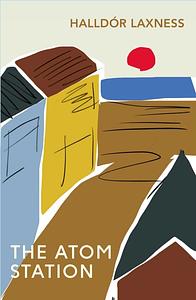Take a photo of a barcode or cover
slow-paced
Excellent quirky take showing the pomposity and greed of Icelandic politicians. Sarcastic, thoughtful and engaging, this is one of the best books written.
challenging
dark
funny
mysterious
slow-paced
Plot or Character Driven:
A mix
Strong character development:
Complicated
Loveable characters:
Complicated
Diverse cast of characters:
Yes
Flaws of characters a main focus:
Yes
L'indipendenza dell'Islanda, appena proclamata nel 1944 (dopo che dal 1262 era assoggettata alla corona norvegese, passando poi a quella danese), era una condizione difficile per questo giovane paese. L'esercito inglese, poi quello americano occupò l'isola durante la Seconda Guerra, dal momento che la Danimarca era stata, a sua volta, occupata da Hitler. Ufficialmente gli inglesi, e poi gli americani volevano così tenere sotto controllo la Germania nazista (l'Islanda è un punto geograficamente strategico), in realtà però si temeva che volessero solo costruire una grande base atomica per un futuro conflitto nucleare da svolgersi negli della Guerra Fredda.
In questo clima Laxness ambienta il suo romanzo, pubblicato nel 1948. L'Islanda non era preparata per la brutalità del mondo moderno, soprattutto da parte di quei dèi della modernità, che erano gli americani. La sua popolazione, prevalentemente rurale, non aveva mai usato elettrodomestici o visto banconote. Si guidava ancora secondo i principi delle antiche saghe. Il capitalismo americano irrompe quindi nella società islandese con una tale violenza da creare frequentemente crisi di identità.
Ugla, la protagonista della storia, che arriva dal lontano nord e fa l'inserviente a Reykjavik, nella famiglia di un deputato (ma sogna di imparare a suonare l'organo), si muove in questa società schizofrenica, dai tratti kafkiani e postcoloniali, nella ricerca di una sua identità e autonomia. Laxness si dimostra un grande scrittore: adotta stili diversi per descrivere situazioni distinte. Utilizza la lingua al meglio per trasmettere il senso di confusione e di alienazione della società. Soprattutto, analizza scrupolosamente la condizione delle donna in una società che, da questo punto di vista, aveva ancora tanta strada da fare.
L'impegno morale (e politico) di Laxness, si legge nell'eccellente postfazione di Giuliano d'Amico (la quale contestualizza perfettamente il romanzo avvicinandolo al lettore moderno anche in mancanza di conoscenze preliminari), gli costò una citazione in giudizio. A Laxness fu tolto il contributo statale dal Parlamento! Inoltre, ebbe problemi a far tradurre il libro in altre lingue europee.
In questo clima Laxness ambienta il suo romanzo, pubblicato nel 1948. L'Islanda non era preparata per la brutalità del mondo moderno, soprattutto da parte di quei dèi della modernità, che erano gli americani. La sua popolazione, prevalentemente rurale, non aveva mai usato elettrodomestici o visto banconote. Si guidava ancora secondo i principi delle antiche saghe. Il capitalismo americano irrompe quindi nella società islandese con una tale violenza da creare frequentemente crisi di identità.
Ugla, la protagonista della storia, che arriva dal lontano nord e fa l'inserviente a Reykjavik, nella famiglia di un deputato (ma sogna di imparare a suonare l'organo), si muove in questa società schizofrenica, dai tratti kafkiani e postcoloniali, nella ricerca di una sua identità e autonomia. Laxness si dimostra un grande scrittore: adotta stili diversi per descrivere situazioni distinte. Utilizza la lingua al meglio per trasmettere il senso di confusione e di alienazione della società. Soprattutto, analizza scrupolosamente la condizione delle donna in una società che, da questo punto di vista, aveva ancora tanta strada da fare.
L'impegno morale (e politico) di Laxness, si legge nell'eccellente postfazione di Giuliano d'Amico (la quale contestualizza perfettamente il romanzo avvicinandolo al lettore moderno anche in mancanza di conoscenze preliminari), gli costò una citazione in giudizio. A Laxness fu tolto il contributo statale dal Parlamento! Inoltre, ebbe problemi a far tradurre il libro in altre lingue europee.
Decent pinch of Cold War satire, with the Icelandic bourgeois proclaiming even raffle tickets to be communist plots, and a nice amount of rumination on what it means to be free.
challenging
slow-paced
Strong character development:
Complicated
Loveable characters:
No
Diverse cast of characters:
No
Flaws of characters a main focus:
No
The elements of magical realism fascinated me in this well-translated novel, and my high hopes after reading Laxness’ Fish Can Sing were reached.
DNF. After 50% read, I still do not have a clue what is really going on. I fear the superficial story is without purpose if one does not understand the subject matter and context for the satire - and I have not that necessary understanding.
This is the story of Ulga, a woman in her early twenties, native of a village in northern Iceland, who moves to Reykjavik to work as a maid in the house of the member of parliament for her district. She dreams of saving enough money to afford lessons to learn how to play the harmonium and play it at the church her father is building in her village. She is not very educated and somewhat naïve, but outspoken and determined. She will take offense from no one, not even her snobby employer. In the course of the story she will encounter all sort of strange characters; men who claim to be gods, an Atom poet, an anarchist music teacher, a snobby prostitute named Cleopatra, policemen who are thieves, and priests with strange beliefs. The story is a wild ride infused with dark humor and mockery of upper classes and religion. But overall, a feminist story. While many authors believe that women characters must be constrained by moral conventions of the time and show a subtle sense of empowerment, Laxness has gone full-on into creating a heroine like no other. She is determined not to be a damsel in distress no matter what life throws her way and emerges like a savior of her loved one. She is the knight in shiny armor rescuing HIM from the pire.
However, it is not an easy read. It may be because of its satirical elements, it's unpredictability or maybe even the more-literal approach to translation. But, let me tell you something. Since I put it down I have been fighting the urge to re-read all over again. It is mesmerizing and a true work of art. Well, I guess they don't hand out Nobels for nothing. Recommendation: read it, laugh and re-read it. Repeat as necessary.
However, it is not an easy read. It may be because of its satirical elements, it's unpredictability or maybe even the more-literal approach to translation. But, let me tell you something. Since I put it down I have been fighting the urge to re-read all over again. It is mesmerizing and a true work of art. Well, I guess they don't hand out Nobels for nothing. Recommendation: read it, laugh and re-read it. Repeat as necessary.
A strange book. I definitely didn't get all the satire, as I am not Icelandic and know almost nothing about the country now, let alone during the time period after WWII. Despite all that, I still liked it.





